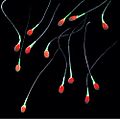Motility
Motility refers to the ability of an organism or fluid to move spontaneously and actively, consuming energy in the process. It is not to be confused with mobility, which describes the ability of an object or organism to move, with or without assistance. Most animals are motile but the term applies to unicellular and simple multicellular organisms, as well as to some mechanisms of fluid flow in multicellular organisms and to some mechanisms of molecular biology.
Types of Motility[edit]
Motility may refer to:
- Cell migration, the movement of cells from one location to another, driven by protrusion of the cell membrane.
- Flagellar motility, a type of movement involving the whip-like appendages on cells.
- Ciliary motility, movement that uses hair-like structures to propel an organism or move fluid over a cell.
- Muscle contraction, the movement of a muscle in response to a signal from the nervous system.
- Cytoplasmic streaming, the directed flow of cytosol and organelles around large fungal and plant cells.
- Molecular motor, proteins that move along the surface of a suitable substrate. They are powered by the hydrolysis of ATP and convert chemical energy into mechanical work.
- Brownian motion, the random movement of particles in a fluid due to their collisions with other atoms or molecules.
- Gut motility, the stretching and contractions of the muscles in the gastrointestinal tract.
Clinical Significance[edit]
Motility issues can lead to a variety of health problems. For example, decreased gastrointestinal motility can lead to constipation, while increased motility can lead to diarrhea. In addition, motility issues can also affect other systems in the body, such as the nervous system, where decreased motility can lead to conditions like Parkinson's disease.
See Also[edit]
Ad. Transform your life with W8MD's Budget GLP-1 injections from $75


W8MD offers a medical weight loss program to lose weight in Philadelphia. Our physician-supervised medical weight loss provides:
- Weight loss injections in NYC (generic and brand names):
- Zepbound / Mounjaro, Wegovy / Ozempic, Saxenda
- Most insurances accepted or discounted self-pay rates. We will obtain insurance prior authorizations if needed.
- Generic GLP1 weight loss injections from $75 for the starting dose.
- Also offer prescription weight loss medications including Phentermine, Qsymia, Diethylpropion, Contrave etc.
NYC weight loss doctor appointmentsNYC weight loss doctor appointments
Start your NYC weight loss journey today at our NYC medical weight loss and Philadelphia medical weight loss clinics.
- Call 718-946-5500 to lose weight in NYC or for medical weight loss in Philadelphia 215-676-2334.
- Tags:NYC medical weight loss, Philadelphia lose weight Zepbound NYC, Budget GLP1 weight loss injections, Wegovy Philadelphia, Wegovy NYC, Philadelphia medical weight loss, Brookly weight loss and Wegovy NYC
|
WikiMD's Wellness Encyclopedia |
| Let Food Be Thy Medicine Medicine Thy Food - Hippocrates |
Medical Disclaimer: WikiMD is not a substitute for professional medical advice. The information on WikiMD is provided as an information resource only, may be incorrect, outdated or misleading, and is not to be used or relied on for any diagnostic or treatment purposes. Please consult your health care provider before making any healthcare decisions or for guidance about a specific medical condition. WikiMD expressly disclaims responsibility, and shall have no liability, for any damages, loss, injury, or liability whatsoever suffered as a result of your reliance on the information contained in this site. By visiting this site you agree to the foregoing terms and conditions, which may from time to time be changed or supplemented by WikiMD. If you do not agree to the foregoing terms and conditions, you should not enter or use this site. See full disclaimer.
Credits:Most images are courtesy of Wikimedia commons, and templates, categories Wikipedia, licensed under CC BY SA or similar.
Translate this page: - East Asian
中文,
日本,
한국어,
South Asian
हिन्दी,
தமிழ்,
తెలుగు,
Urdu,
ಕನ್ನಡ,
Southeast Asian
Indonesian,
Vietnamese,
Thai,
မြန်မာဘာသာ,
বাংলা
European
español,
Deutsch,
français,
Greek,
português do Brasil,
polski,
română,
русский,
Nederlands,
norsk,
svenska,
suomi,
Italian
Middle Eastern & African
عربى,
Turkish,
Persian,
Hebrew,
Afrikaans,
isiZulu,
Kiswahili,
Other
Bulgarian,
Hungarian,
Czech,
Swedish,
മലയാളം,
मराठी,
ਪੰਜਾਬੀ,
ગુજરાતી,
Portuguese,
Ukrainian










